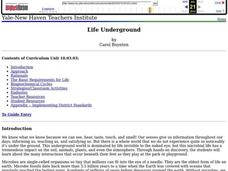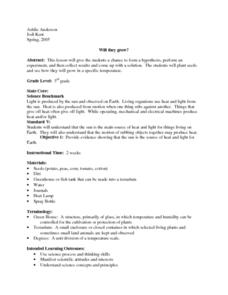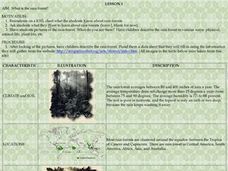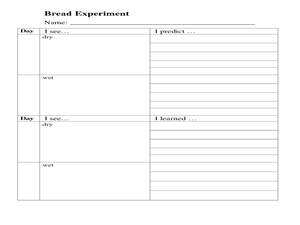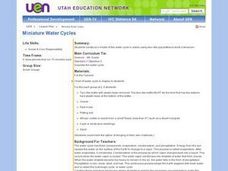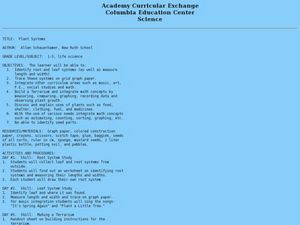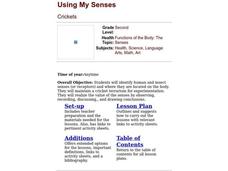Curated OER
Basic Needs of Living Things - Lesson Two
Fourth graders study and identify the basic needs of a variety of organisms. Terrariums and aquariums are used to demonstrate what plants, animals, and fish need to stay alive. These two classic models are used to effectively convey what...
Curated OER
Marine & Aquatic Habitats Activities - Habitats of Birds, Fish, and Mammals on the Island and the Pacific Region
Learners create habitats in jars to understand integral aspects of plants' and animals' habitats.
Curated OER
Habitats: must live with them....cannot live without them.
Students conduct an internet study regarding habitat, ecosystem, biome and the region they live in. They observe the habitat by visiting a State Park and observing the organisms in their habitat. In addition, they create their own...
Curated OER
Mayan Farming Practices
The introduction of this lesson requires reading a from The Maya by Jaqueline Dembar Greene. Learners sketch a Mayan during the reading. Teaching strategies include direct instruction, grouping the students for discussions, reasearch,...
Curated OER
The Water Cycle - starring "Drippy"!
Students become actively involved in building a model illustrating how energy, such as the water cycle, flows through a system. In making a terrarium, the student understands the flow of energy, beginning with the sun, and making a...
Curated OER
Rain Forest Adventures
Young scholars discover locations of the world's rain forests. Once they identify the animals, plants, products, and resources located in them, they construct they own rain forest terrariums. By comparing and contrasting the two types...
Curated OER
Arthropods at Home- Spider, Isopod, or Any Arthropod
Students design a habitat for an arthropod. In this organisms lesson, students read the book, A House is a House For Me. Students find an arthropod and create a terrarium.
Curated OER
Life Underground
First graders build a terrarium in order to observe animal and plant life dynamics. In this biology lesson, 1st graders compare how organisms survive in different environments. They write their observations and analysis in their journal.
Curated OER
Water Cycle
Second graders investigate the water cycle. In this water cycle instructional activity, 2nd graders discover how the water cycle effects erosion and weathering. Students create their own terrariums to view the water cycle. Students...
Curated OER
Will they grow?
Third graders plant seeds and see how they will grow in a specific temperature and are questioned about different environments and how they think crops would grow there. They form a hypothesis, perform an experiment, and then collect...
Curated OER
What is the Rainforest?
Students investigate rainforests. In this rainforest lesson, students brainstorm on a KWL chart about what they already know about the rain forest. Students are shown pictures of the rain forest and describe what they see in the photos....
Curated OER
Forest Decomposition
Learners explore decomposition. Students define and describe components of the decomposition process. Learners make a composter in a terrarium. Students record observations and changes weekly, drawing conclusions about the results of...
Curated OER
Caterpillars To Butterflies
Students gain an appreciation of nature by teaching them about the life cycle of the butterfly. They set up a terrarium so they can observe the changes a caterpillar goes through.
Curated OER
Gaia: The Wisdom of the Earth
Learners are introduced to Gaia theory of natural homeostasis. They graph Earth's temperatures over time, construct terrariums or monitor the outdoor environment. Related videos titles are suggested, but may be outdated. The objectives...
Curated OER
Miniature Water Cycles
Fourth graders create a biome of their choosing in a terrarium. Terrariums are observed and results recorded daily for 2 weeks. They observe/record changes in the water within their terrarium and use the data to write sentences...
Curated OER
Water, Water Everywhere
Students explore water. For this water cycle lesson, students conduct a scientific investigation that requires build a terrarium models of the earth. Students record their observations of the changes regarding water in the terrarium.
Curated OER
Food Chains And Webs
Students investigate the concept of soil and all its components. They collect samples from a local site and transplant it into a terrarium. Students identify the organic elements, clay ,silt, and other forms of debris. They also identify...
Curated OER
Using My Senses
Students observe crickets in the terrarium. Have them record in their journal any evidence of crickets having senses. Then they answer questions like these: How do they use their sense organs? Where are they are located?
Curated OER
Plant Systems
Students examine plant systems. In this life science lesson plan, students explore leaf and root systems on paper in a terrarium that they design and construct.
Curated OER
Miniature Water Cycles
Students construct a model of the water cycle in action using two-liter pop bottles to build a terrarium. Locate examples of evaporation and condensation in the water cycle (e.g., water evaporates when heated and clouds or dew forms when...
Curated OER
Using My Senses
Second graders identify human and insect senses and where they are located on the body. They maintain a cricket terrarium for experimentation. They realize the value of the senses by observing, recording, discussing and drawing conclusions.
Curated OER
Ecology and the Conservation of Natural Resources
Students examine the habits of various organism and evaluate the need for conserving natural resources. They role-play as migrating birds traveling between habitats encountering hazards along the way. They observe animals in a...
Curated OER
Exploring Ecosystems
Fourth graders create an ecosystem as a class. They have already produced smaller ones. They use a pond or something similar on school grounds to meet the needs of certain plants and animals of their ecosystem. Specifically created will...
Curated OER
Water, Water, Everywhere and Always on the Move
Middle schoolers create their own water cycle in a terrarium. In this water cycle lesson, students research the water cycle and complete a worksheet using the Internet. They create a water cycle of their own in a jar with stones, sand,...
Other popular searches
- Science Project Terrarium
- Ecosystem Bottle Terrarium
- Carbon Cycle Terrarium
- Making a Terrarium
- Soda Bottle Terrarium
- Building a Terrarium
- Terrarium Science Experiment
- Rainforest Terrarium
- Terrarium and the Water Cycle
- Rain Forest Terrarium
- Water Cycle Terrariums
- Mini Terrariums









